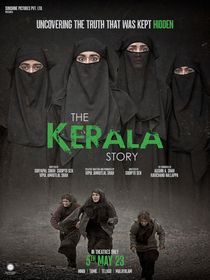A one minute teaser of the film The Kerala Story, which tells the story of girls who are allegedly forcibly converted to Islam and sent to the Islamic State ruled areas and tortured, shows the testimony of a burqa-clad woman who states that her name is Shalini Unnikrishnan, and that there are 32,000 girls like her who have been converted, and are buried in the desert in Syria and Yemen. She claims there is a dangerous game underway in Kerala to turn ‘normal girls’ into terrorists and that this is an open secret.
Fact checker Alt News conducted an extensive check on the claims made in the trailer, including interviewing the director and found that it is replete with blatant lies, and is based on misquoting two former chief ministers, some bogus mathematical calculations, vilifying an already persecuted minority, maligning a whole state and claiming it is “a true story”. The most stunning revelation being that the figure of 32,000 trafficked women is actually three, maybe four!
Now one may brandish the notion of cinematic liberty, but should a film advertising itself as a true story be let off the hook for lying and misleading audiences? Moreover, there is something far more sinister underway. Increasingly, since 2019, Bollywood has been churning out films that mirror or further the Sangh ideology—either obviously or covertly. Starting out with Padmaavat (2018), Panipat (2019) and Tanhaji (2020), historicals in Bollywood have bought into the RSS re-writing of medieval Indian history positing Muslim rulers as barbaric and inhuman invaders, rapists and oppressors; whilst Hindu kings are reimagined as not just monarchs but saviours of ‘dharma’.
Propaganda films reached a recent peak of both misinformation and box office collections in the form of The Kashmir Files. Like The Kerala Story, The Kashmir Files inflated the number of Kashmiri Pandits killed by terrorists to more than 4,000, whereas the Jammu and Kashmir government said in March 2010 on the floor of the legislative assembly that 219 Kashmiri Pandits were killed by militants from 1989 to 2004. Unofficial records widely corroborate the number of deaths as being in the lower hundreds.
Let’s be clear, no death is justified and even one person being murdered by terrorists or losing their life to violence is too many. But to use the trauma and the pain of a historical wrong, then inflate it, exaggerate, add fictitious sensational details, throw in some trauma porn, and further add to the negative stereotyping of an already marginalised people is plain unethical. To profit from these unsavoury ventures is evil.
Numerous theatres in India reported incidents of anti-Muslim sloganeering, which included threats of violence at the film screenings. In April 2022, Khargone in Madhya Pradesh reported riots after a provocative tableaux of The Kashmir Files during a Ram Navami procession led to Hindus clashing with Muslims near a mosque.
So, clearly, cinema has power. And no one has understood the power of Bollywood like the RSS-BJP. And producers, even if they are not communal, are most certainly cynical businessman. Once a winning formula is established, they milk it for maximum profits. The Kashmir Files has established a formula—take a historical event with some kernel of truth in it, exaggerate it to grotesque limits, pander to majoritarian stereotypes of marginalised communities, add many dog whistles, throw in some nationalist rhetoric, collapse religion and nation into one and whip up a fantasy of violence by Muslims and persecution of Hindus—in the promotions and marketing claim that it is ‘a true story’. The Kerala Story is only following the formula.
I have a challenge for these filmmakers who love to base their work on real events and true stories. And they don’t need to go all the way to Syria. Make a film on the eight-year-old gangrape victim of Kathua, the rape of the girl in Unnao allegedly by Kuldeep Sengar, the Hathras gangrape, the allegations by women wrestlers of sexual exploitation by Brij Bhushan Sharan. Come on,
I dare you!
The writer is an award-winning Bollywood actor and sometime writer and social commentator.


